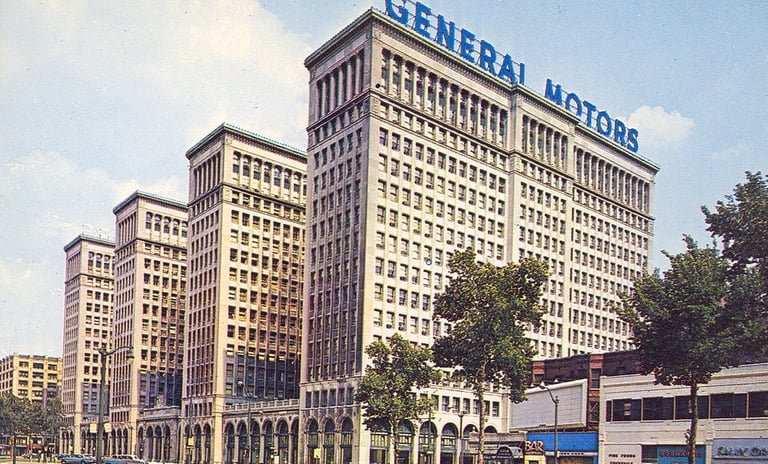General Motors' Impact on Detroit’s Economy: Driving Growth and Transformation
Explore how General Motors has shaped Detroit’s economy over the decades. From job creation and industrial innovation to urban revitalization and global influence, GM’s presence continues to drive Detroit’s economic transformation.
8/14/20255 min read
Detroit, often called the Motor City, owes much of its economic identity to the automotive industry. At the center of this story is General Motors, one of the world’s largest automakers and a defining force in Detroit’s industrial landscape. From its founding in 1908 to its modern-day operations, GM has played a central role in shaping the city’s economic, social, and cultural fabric.
The impact of General Motors on Detroit extends far beyond the vehicles it manufactures. The company has influenced employment trends, urban development, technological innovation, and the overall prosperity of the region. In many ways, GM is intertwined with Detroit’s identity, and understanding its influence helps explain why the city remains a hub of manufacturing and innovation in the United States.
Historical Significance of General Motors in Detroit
General Motors was founded in Flint, Michigan, in 1908 and quickly expanded its operations to Detroit. By the 1920s, GM had established itself as a cornerstone of the American automotive industry. Detroit became the epicenter for automotive innovation, attracting workers, suppliers, and entrepreneurs from across the country.
GM’s rise coincided with Detroit’s economic boom, creating thousands of well-paying jobs and supporting countless ancillary industries. Steel suppliers, parts manufacturers, design firms, and logistics companies all benefited from GM’s growth. The company’s early success helped establish Detroit as the global capital of automotive manufacturing, cementing its reputation as the Motor City.
GM’s influence also extended to labor and social policies. The company played a significant role in the rise of labor unions, including the United Auto Workers, which fought for fair wages and benefits. These efforts shaped Detroit’s working-class identity and contributed to the city’s socioeconomic development.
Employment and Workforce Development
One of the most visible impacts of General Motors on Detroit’s economy is employment. At its peak, GM employed hundreds of thousands of workers in the region, providing stable, high-paying jobs that supported families and communities. Even today, GM remains one of the largest employers in Michigan, offering positions across manufacturing, engineering, research, and corporate administration.
The company’s commitment to workforce development has created opportunities for skill-building and career advancement. GM invests heavily in training programs, apprenticeships, and educational partnerships with local colleges and technical schools. These programs help prepare Detroit residents for careers in automotive manufacturing, advanced engineering, and technology.
By fostering a skilled workforce, GM not only supports its own operations but also strengthens Detroit’s broader labor market. The company’s influence ensures that generations of workers have access to sustainable employment and career growth opportunities, which in turn stimulates local spending and economic activity.
Innovation and Technological Advancement
General Motors has always been at the forefront of innovation, and its presence in Detroit has made the city a hub for technological advancement. From pioneering assembly line techniques to developing electric and autonomous vehicles, GM has consistently pushed the boundaries of automotive technology.
The company’s research and development facilities in Detroit and surrounding areas attract engineers, designers, and scientists from around the world. These professionals contribute to cutting-edge projects in electric mobility, battery technology, vehicle connectivity, and artificial intelligence. The resulting innovations not only enhance GM’s competitiveness but also generate knowledge spillovers that benefit other local industries and startups.
Detroit’s reputation as an innovation center has been reinforced by GM’s focus on sustainable transportation solutions. The company’s investments in electric and autonomous vehicle technologies position Detroit as a leader in the automotive industry of the future, attracting talent, investment, and global attention.
Economic Multiplier Effect
GM’s economic impact extends far beyond its direct employment. The company stimulates a wide range of local businesses, creating what economists call a multiplier effect. Suppliers of steel, plastics, electronics, and other materials benefit from GM’s operations. Local service providers, including logistics firms, construction companies, and maintenance contractors, also see increased demand.
When GM employees spend their earnings in Detroit on housing, food, entertainment, and education, additional economic activity is generated. This multiplier effect strengthens local businesses, boosts tax revenues, and contributes to the overall vitality of the city. In essence, GM’s presence creates an interconnected ecosystem of economic benefits that extends well beyond its factory floors.
Urban Revitalization and Infrastructure
Beyond industry and employment, General Motors has influenced Detroit’s urban development. The company’s headquarters and production facilities have spurred investments in surrounding neighborhoods, including residential developments, commercial spaces, and public infrastructure.
GM’s move to modernize its Renaissance Center headquarters exemplifies the company’s role in urban revitalization. By investing in high-quality office spaces, public areas, and amenities, GM contributes to a vibrant downtown that attracts other businesses, tourists, and residents. The revitalization of the riverfront, parks, and transportation infrastructure around GM facilities further enhances the city’s livability and economic appeal.
In addition, GM’s involvement in community development projects, charitable initiatives, and educational programs underscores its commitment to the social and economic health of Detroit. The company’s influence extends beyond profits, shaping the city’s identity as a resilient, innovative urban center.
Challenges and Resilience
While GM has been a force for economic growth, the company and the city of Detroit have also faced challenges. Economic downturns, global competition, and shifts in consumer demand have occasionally strained operations and employment levels. The 2008 financial crisis, for example, led to significant restructuring in the automotive sector, including temporary layoffs and plant closures.
Despite these challenges, GM’s resilience has been a stabilizing factor for Detroit. Strategic investments, innovation in electric and autonomous vehicles, and partnerships with local communities have helped the company recover and continue to drive economic growth. Detroit’s economy, while diversified today, still relies heavily on GM’s continued presence and leadership in the industry.
GM’s Global Reach and Local Influence
General Motors’ impact on Detroit is magnified by its global reach. As a multinational corporation, GM attracts international investment, partnerships, and talent to the city. Global exposure enhances Detroit’s profile as a center of industrial excellence and innovation.
The company’s international operations also benefit local suppliers and workforce development initiatives. Detroit-based businesses involved in global supply chains gain access to new markets, while local employees develop skills that are applicable in international contexts. This dual role—global influence with local benefits—makes GM a unique economic driver for the city.
Looking Ahead
The future of Detroit’s economy remains closely tied to General Motors. As the automotive industry evolves with electric vehicles, autonomous driving technology, and sustainable mobility solutions, GM’s continued investment in research, development, and manufacturing will be critical.
Emerging trends in green technology and smart manufacturing create opportunities for Detroit to maintain its leadership in the global automotive market. GM’s strategic initiatives in these areas ensure that the city remains a hub for innovation, talent, and economic growth.
The company’s commitment to sustainability, urban revitalization, and workforce development positions Detroit for long-term prosperity. By balancing corporate goals with community impact, GM continues to serve as both an economic engine and a social catalyst for the city.
Conclusion
General Motors has been a cornerstone of Detroit’s economy for over a century. Its influence extends from job creation and industrial innovation to urban revitalization and global economic connections. The company’s presence has shaped the city’s labor market, stimulated local businesses, and contributed to Detroit’s identity as the Motor City.
As Detroit navigates the challenges and opportunities of the 21st century, GM remains a key player in driving economic growth, innovation, and community development. The company’s legacy is a testament to the enduring power of industry to transform cities, create opportunities, and inspire progress.
Detroit’s future continues to be intertwined with General Motors, and the city’s prosperity depends on the ongoing partnership between this iconic automaker and the vibrant communities it supports.


